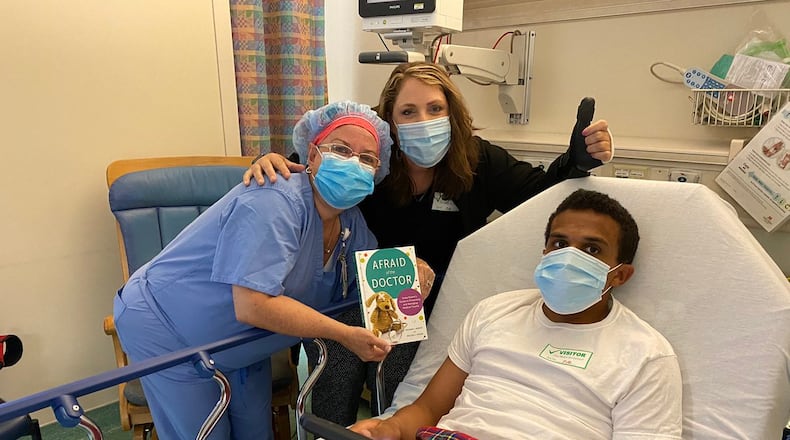In this guest column, Dr. Meghan Marsac, a pediatric psychologist, and Melissa J. Hogan, a mom to a child with a rare and chronic condition, write about the need for more awareness concerning medical anxiety and trauma and of strategies to support children and families through the emotional challenges of health care.
Parenting is the greatest gift and the greatest challenge. From that first moment of watching our child asleep in our arms to their first day of school to packing them up for their next adventure, our lives are a mix of joy and hope sprinkled with a lot of dirt and heartache.
When our child faces a medical challenge, all of our feelings can intensify. A new diagnosis or frustrating or frightening trip to the doctor can shift almost everything in our lives. The daily impact of medical care can affect school, childcare, meals, and general family life. The loss of sleep, even beyond the typical parenting loss of sleep, can compound these challenges when we add medical worries into regular parenting worries. The minute we hear the words, “Your child has (insert new diagnosis),” everything changes.
I (Melissa) know this because this is what happened with my son. At two years old, my son was diagnosed with a rare, genetic condition called Hunter syndrome, also known as Mucopolysaccharidosis II. Essentially, his body couldn’t break down certain cellular waste, so all of a sudden, he was seeing ten specialists, receiving a weekly infusion, and spending a lot more time in hospitals. He was okay with the process and the procedures until suddenly he wasn’t. Kicking and screaming became the norm. Needle sticks, blood pressure checks, everything became a challenge.
Every child or parent’s reaction to medical care and medical conditions is unique, but there are some common threads. Some kids feel completely comfortable with their pediatrician visits and don’t even flinch for vaccinations like flu shots. Others start worrying weeks ahead of time, are up at night, or cry, kick or scream during the same appointment. Some kids are fine one day and then have a hard time another day.
For children with chronic illness, challenging emotions and behaviors can develop or even change over time. Some children develop what is known as “medical trauma.” This can happen to anyone and doesn’t necessarily require that the child has a serious or chronic condition. As defined by the National Child Traumatic Stress Network, medical trauma is “a set of psychological and physiological responses of children and their families to pain, injury, serious illness, medical procedures, and invasive or frightening treatment experiences.” In other words, medical trauma involves reactions in your mind or body to scary medical stuff.
I (Dr. Marsac) have seen professionally how even kids without serious medical conditions can develop fears about getting shots (hello, COVID vaccines!), bloodwork, or even just going to the doctor. I’ve had the opportunity to walk with families on their journeys through medical conditions such as cancer, pain disorders, injuries, surgeries, Crohn’s disease, and many others.
These experiences brought us together to write, Afraid of the Doctor: Every Parent’s Guide to Preventing and Managing Medical Trauma. This book is a guide for parents on how to manage the emotional impact that healthcare can have not only on children but on their whole family.
Our goal for Afraid of the Doctor is to provide parents with applicable strategies to help their child navigate medical care and to start a conversation about how medical conditions and healthcare need to include mental health as part of children’s overall well-being. A 2016 review by Julia Price, a research scientist and pediatric psychologist, and her colleagues suggested that 30% of children with illnesses or injuries and 30% of their parents develop significant medical trauma reactions. This affects millions of children and families every year. If you are experiencing medical trauma reactions, you are not alone. Your child is not alone. And help is out there.
We wanted parents to be able to connect with examples of how to use the strategies and to identify with the book, so we follow the stories of four families and share examples of the content and strategies through their journeys. Each story is based on a combination of our own experiences and those of people we’ve met.
We share Cameron’s family’s story, which highlights the challenges of injury recovery, working with teenagers with health conditions, and the struggle that many parents face during their child’s health journey -- we see how medical conditions affect the whole family.
We also introduce Nia, an 8-year-old battling cancer, and her sister Sara; we follow Nia’s challenges taking medications and challenges cooperating with the medical team. We also show a bit of Sara’s journey as well, highlighting siblings’ experiences of a child’s medical condition.
The story of Jin is the journey of a 4-year-old, who is adopted, has some communication challenges, and is diagnosed with type 1 diabetes. Finally, we include the story of Daniel, his biological mother, and his grandparents (who take care of him). Daniel is diagnosed with Hunter syndrome, and we walk along his family’s journey as they learn new strategies to help him with his emotions and behaviors during his medical care. We hope that parents will be able to identify with a piece of one or more of these stories woven throughout the book.
While Afraid of the Doctor has many strategies to help parents navigate medical care for their family, if you are worried about your child’s or your own emotions or reactions, also reach out to your doctor for help. Your doctor can help you decide if your child or you might benefit from mental health services or additional resources or other types of support.
About the Author
Keep Reading
The Latest
Featured



